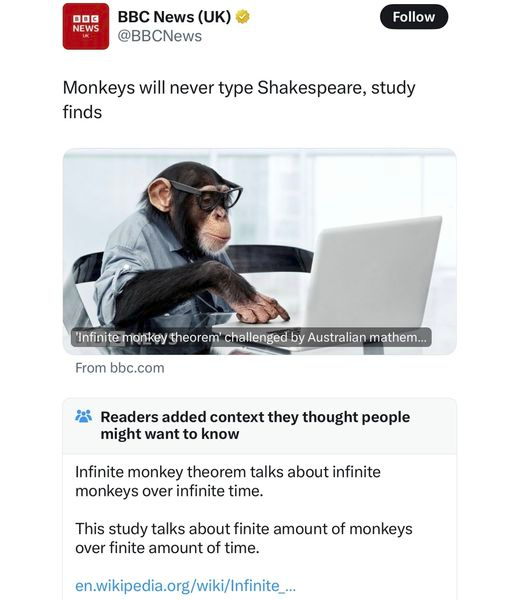1178
you are viewing a single comment's thread
view the rest of the comments
view the rest of the comments
this post was submitted on 03 Nov 2024
1178 points (98.7% liked)
Science Memes
18524 readers
1827 users here now
Welcome to c/science_memes @ Mander.xyz!
A place for majestic STEMLORD peacocking, as well as memes about the realities of working in a lab.

Rules
- Don't throw mud. Behave like an intellectual and remember the human.
- Keep it rooted (on topic).
- No spam.
- Infographics welcome, get schooled.
This is a science community. We use the Dawkins definition of meme.
Research Committee
Other Mander Communities
Science and Research
Biology and Life Sciences
- !abiogenesis@mander.xyz
- !animal-behavior@mander.xyz
- !anthropology@mander.xyz
- !arachnology@mander.xyz
- !balconygardening@slrpnk.net
- !biodiversity@mander.xyz
- !biology@mander.xyz
- !biophysics@mander.xyz
- !botany@mander.xyz
- !ecology@mander.xyz
- !entomology@mander.xyz
- !fermentation@mander.xyz
- !herpetology@mander.xyz
- !houseplants@mander.xyz
- !medicine@mander.xyz
- !microscopy@mander.xyz
- !mycology@mander.xyz
- !nudibranchs@mander.xyz
- !nutrition@mander.xyz
- !palaeoecology@mander.xyz
- !palaeontology@mander.xyz
- !photosynthesis@mander.xyz
- !plantid@mander.xyz
- !plants@mander.xyz
- !reptiles and amphibians@mander.xyz
Physical Sciences
- !astronomy@mander.xyz
- !chemistry@mander.xyz
- !earthscience@mander.xyz
- !geography@mander.xyz
- !geospatial@mander.xyz
- !nuclear@mander.xyz
- !physics@mander.xyz
- !quantum-computing@mander.xyz
- !spectroscopy@mander.xyz
Humanities and Social Sciences
Practical and Applied Sciences
- !exercise-and sports-science@mander.xyz
- !gardening@mander.xyz
- !self sufficiency@mander.xyz
- !soilscience@slrpnk.net
- !terrariums@mander.xyz
- !timelapse@mander.xyz
Memes
Miscellaneous
founded 3 years ago
MODERATORS

The whole thing is dumb if you accept a premise of "infinite monkeys". An infinite number of monkeys will type the works of shakespeare immediately, because an infinite number of them will start with the very first key they hit and continue until the end. (So it'll be complete exactly as fast as a monkey can type it, typing as fast as simianly possible, with no mistakes.) You don't even need the infinite time.
It only becomes interesting if you look at the finite scenarios.
And BTW, the lifespan of the universe is finite due to the eventual decay of all matter, including the monkeys and the typewriters. There's no infinite time.
A more interesting calculation the mathematician should have done is how many monkeys are needed to write Shakespeare in the lifespan of the universe rather than starting with 200k.
I don't think there is a finite number of monkeys that would be guaranteed to do so in the lifespan of the universe.
Best we could do is calculate the expected number of monkeys it would take, assuming accurate probabilities, which I also don't think is possible to determine.
You can't just take one divided by the number of possible characters that could be typed because monkeys can do many things other than typing away. A high portion of them would likely instead destroy the typewriter. In the infinite monkeys scenario, an infinite amount would destroy their typewriter in the middle of Hamlet's to be or not to be soliloquy.
Plus the odds of it actually happening are going to be so astronomically low that if you filled the known universe with monkeys, you'd end up with monkey stars and black holes before any Shakespeare.
It really only works as a thought experiment about the nature of infinity.
Unless there's an infinite multiverse, in which case we are in the universe where a monkey wrote out the complete works of Shakespeare. That monkey's name? Shakespeare. (And yes, many clapped when he did so.)
Saying that last bit about time is not particularly meaningful for two reasons.
First of all, we do not especially know the end state of the universe. It may not be true that all matter decays, and protons may be stable. We may be in a false vacuum which will spontaneously collapse in large timespans.
Second of all, the hypothetical is a thought experiment. The monkeys are a placeholder for any random generation of characters. The thought experiment also does not take into consideration the food required to feed monkeys for infinite time, nor their aging, mutation over generations, and waste logistics. It's not meaningful then to suddenly decide to apply the laws of physics to them. The only laws applicable in this scenario are logic and mathematics.
I generally agree with the rest of your take, although I disagree where you say the thought experiment is dumb. I only have an issue with that last point lol. Cheers.
If thats the point where you want to draw the line, I guess that it becomes dumb at exactly that point.
But the point of the thought experiment is that it says what you said: it will definitelly happen because infinity is absurdly big number.
If you follow it, you quickly end up with the Infinite Improbability Drive from The Hitchhikers Guide - if you have an infinite number of typewriters, an infinite number of them will be loaded with paper that already has the complete works of Shakespeare written on it
You assume that monkeys are identical, communicate with each other and know what they are doing. Take one of these away and all of the infinite monkeys will press the same buttons basically making them one monkey. Take another and they will type random gibberish.
The point of the dilemma is for non of those to be the case. The point is can Shakespeare or anything valuable to humans appear in random given enough time and resources? Basically can "the AI" as we know it now that doesn't actually have "I" create something new and valuable?
And the answer is(going from the basic maths) yes it may produce something cool but it also may never produce Shakespeare or anything cool and will never know what it can do and what it can't.
Deleted